Introduction
A junior SEO specialist recently sent me a late-night message. “Will I even have a job in a year?”
She’d just seen a LinkedIn post showing ChatGPT writing blog posts, optimizing metadata, and suggesting keywords in seconds. Reddit threads, Twitter hot takes, and even a few industry newsletters were all buzzing with the same anxiety.
Even Gartner predicts that search engine volume will drop by 25% by 2026, largely due to the rise of AI chatbots and other virtual agents.
So is SEO dead?
Well, if you’ve been in the game long enough, you’ve seen this before. Social media was supposed to kill SEO. When Google’s algorithm updates like Panda or Penguin penalized low-quality content, SEO careers were again declared over. Then came zero-click SERPs. And now, generative AI tools like ChatGPT, Gemini, and Claude are reigniting the debate with new force.
And fair enough. If AI can research, write, optimize, analyze, and summarize, what’s left for you to do?
This blog answers that head-on. You’ll learn how AI is already changing SEO, what businesses need to do to adapt, and a new term you’ll hear more often: Generative AI SEO (GAISEO).
Will AI Replace SEO?
No, AI will not replace SEO. It will evolve it. There’s a fundamental difference between automating SEO tasks and replacing SEO strategy. AI can automate many SEO tasks, such as generating metadata, clustering topics, or even suggesting keywords.
But what AI can’t yet do is the strategic side of SEO: interpreting ambiguous search intent, building trust through authoritativeness, or understanding nuanced brand positioning. These require human insight, empathy, and real-world experience.
Take tools like SurferSEO or Jasper. They can help structure your content around a keyword. But they don’t know your customer’s pain points. They can’t draw from interviews, case studies, or product knowledge to create content that resonates deeply.
That’s why top SEO professionals are building hybrid workflows: letting AI handle the grunt work, while they focus on strategy, originality, and outcomes.
Why This Question Is Being Asked More Than Ever?
The fear that AI might “kill” SEO isn’t random; it’s rooted in major shifts happening all at once. The way people search, the way Google ranks content, and the rise of generative AI marketing tools have created the perfect storm for career anxiety.
The Surge in AI Tools and Changing Search Behaviours
When OpenAI launched ChatGPT, it wasn’t just marketers who were paying attention; everyone from students to CEOs took notice. According to Semrush’s AI Overviews Study, 13.14% of all Google search queries triggered AI Overviews as of March 2025, up from just 6.49% in January.
Now, you don’t need to open a new tab and Google your question. You could just ask and get a clean, clear, and conversational answer instantly. This shift is visible not just in how people search but in how organizations are adopting AI across the board.
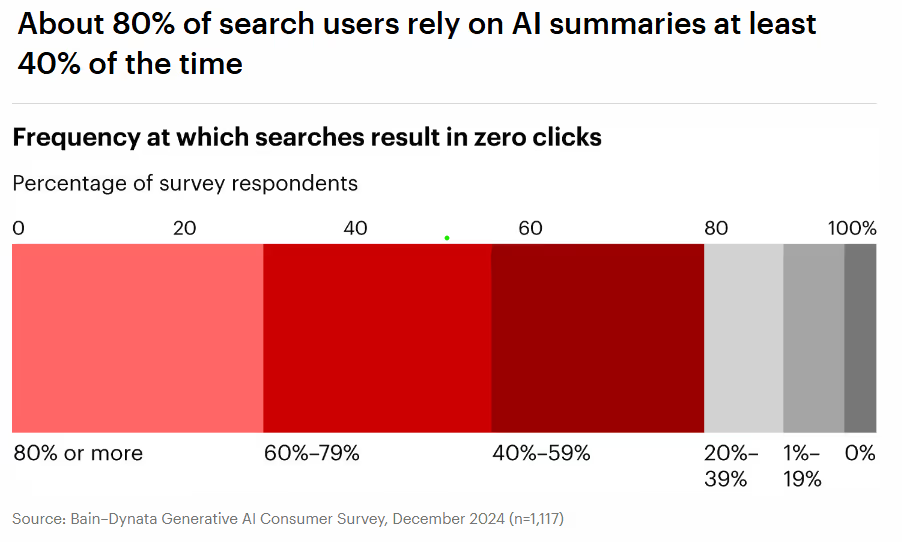
What’s driving this change? A major part is user behavior. Gen Z and Gen Alpha aren’t just typing in keywords; they're asking full questions, expecting nuanced summaries, and engaging with tools like ChatGPT, Gemini, and Bing Chat as primary information sources. These models are fast becoming their default search engines.
In other words, the way we interact with information is fundamentally changing, and so is the infrastructure behind it.
Google’s Shift from Keyword Matching to Intent Prediction
Google is no longer just matching keywords; it’s rewriting how search works from the ground up.
With the rollout of AI Overviews in 2024, search results now include AI-generated summaries that deliver instant, context-rich answers to complex queries. Powered by Gemini, these summaries help users understand topics faster, plan tasks, and explore multi-step reasoning, all without needing to click multiple links.
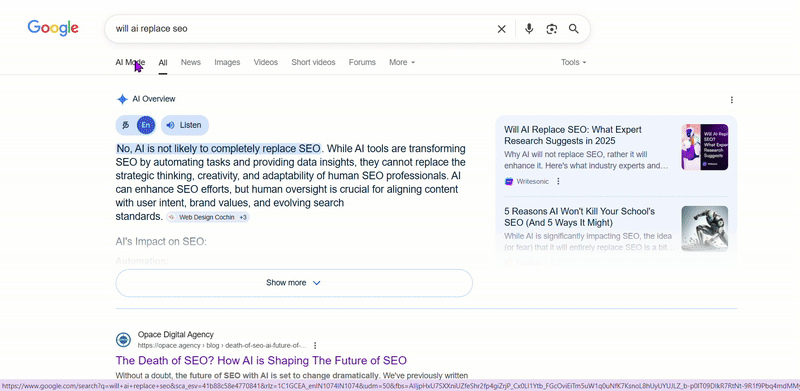
And Google isn’t stopping there. In March 2025, it began testing AI Mode, a new, Gemini 2.0-powered experience available through Search Labs for Google One AI Premium users. This update introduces multimodal search, where users can input text, voice, or images and receive deeply personalized, AI-generated results.
The Rise of “SEO is Dead” Headlines
This isn’t the first time SEO has been declared dead, and it won’t be the last.
In 2012, some claimed social media would kill SEO. In 2018, it was voice search. Now it’s generative AI marketing. But these headlines often come from surface-level observers or vendors trying to sell you their “AI-powered SEO killer” tool.
If you check threads like this one on r/SEO, you’ll notice that most panic comes from junior SEOs or freelance writers worried about automation. Senior SEOs, on the other hand, are doubling down on strategic skills: building authority, improving UX, and mastering AI-assisted workflows.
How AI Is Changing SEO in 2026
AI isn’t looming on the horizon; the future of AI marketing can already be seen transforming how SEO teams work day to day. From content creation to backend technical audits and scalable reporting, AI is becoming the engine behind more efficient workflows.
1. Content Creation, Topic Modeling, and Meta-data Generation
If you’ve ever stared at a blank Google Doc wondering where to begin, AI now fills that gap. Until recently, building SEO content at scale meant dozens of hours in research, outlining, writing, and editing.
Now, with tools like Jasper, Writesonic, and Content Harmony, teams can generate optimized outlines, identify trending keyword clusters, and draft structured content in minutes.
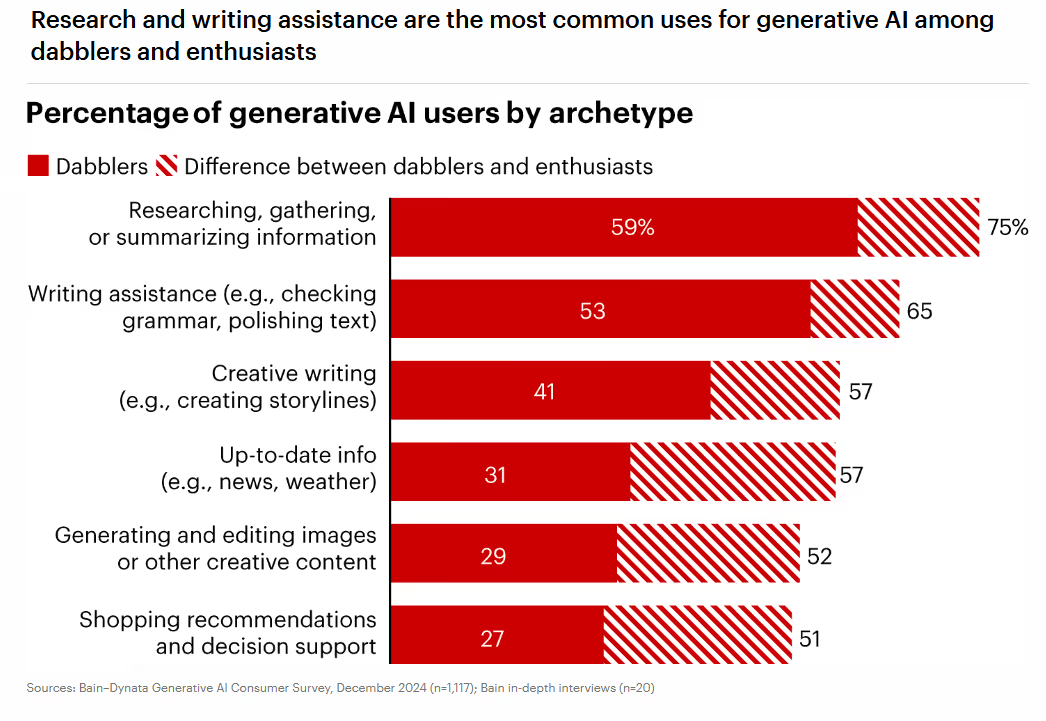
One example of how this works in practice is our collaboration with Everstage, a global sales compensation software platform. They wanted to scale their content output without sacrificing voice or strategic consistency, so we built an AI-powered workflow tailored to their niche.
- First, we conducted deep SERP and intent analysis, identifying what RevOps and SalesOps leaders were actively searching for and how competitors were underperforming.
- Then, we created AI prompts for each content stage from outlining to stat sourcing and metadata writing, so no writer had to start from scratch.
- Our editorial team added human insight, tone refinement, and real-world context to ensure every blog aligned with Everstage’s brand voice.
- Finally, we layered in original images, SEO optimization, and accessibility, using data visuals from trusted sources like McKinsey and Gartner.
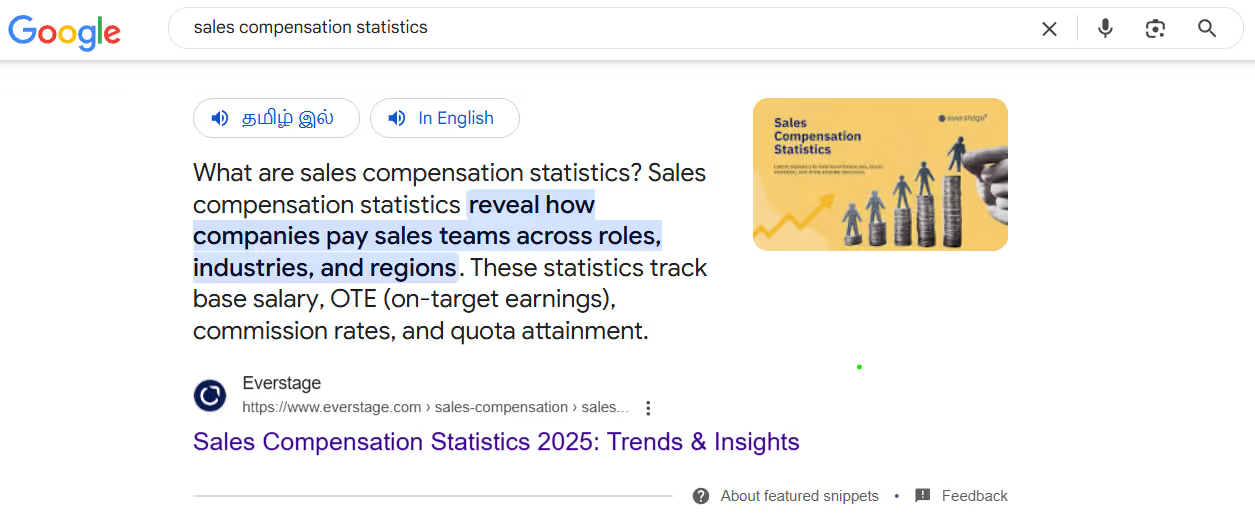
Everstage’s blogs began ranking on Google for competitive keywords like “sales compensation statistics” and were even cited in ChatGPT AI Overviews, elevating their thought leadership visibility.
2. AI‑Powered Tools for Technical SEO
Technical SEO is no longer just a developer’s job; it’s now a playground for AI. From identifying crawl issues to automating schema markup, AI-powered platforms are making it easier to detect, fix, and scale optimizations across hundreds of URLs.
For instance, tools like Screaming Frog (with GPT plug-ins), ContentKing, and SE Ranking can now identify broken links, suggest canonical fixes, and generate structured data instantly.
One SEO professional on Reddit summed it up best: “AI isn’t replacing me. It’s augmenting me.” They shared how AI now handles tedious tasks like schema generation, keyword clustering, and content planning, freeing them up to focus on strategy. By combining embeddings and SERP similarity, they use AI to group keywords by intent in smaller batches, then generate names and descriptions.
We also built our own automation for keyword research to remove the heaviest part of SEO execution. The workflow fetches keyword ideas, SERP data, volume, CPC, and intent into Sheets instantly. This lets us focus on strategy instead of spreadsheets.
Tools like RankYak even automate keyword research and publish content to CMS. Still, every output gets a manual check. AI’s best use is to offload the grunt work, keep control of the big picture.
It’s a sentiment echoed by many in the industry: AI is the assistant that never sleeps, but you’re still the strategist driving the decisions.
3. SEO Teams Using AI to Scale Reporting and Forecasting
Let’s be honest: traditional SEO reporting hasn’t kept up with the pace of content growth. When you’re managing hundreds of blog posts, landing pages, and product updates, waiting a week (or worse, a month) to check what’s working just doesn’t cut it anymore.
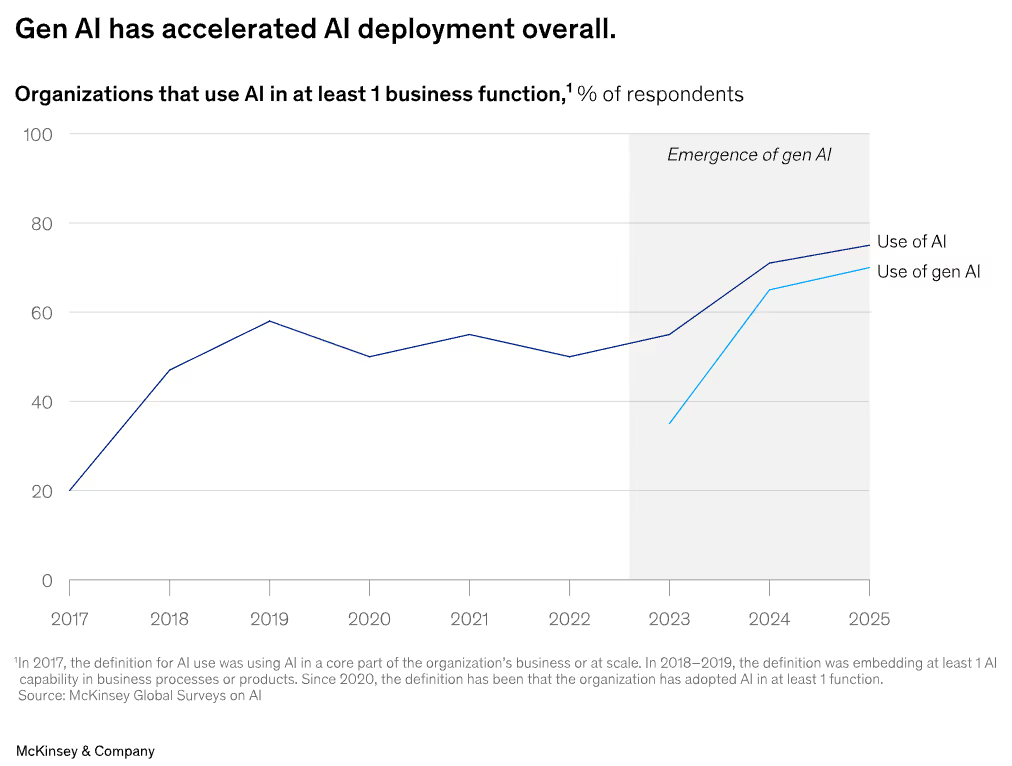
That’s where AI is quietly transforming the game. Instead of spending hours pulling data from different tools, SEO teams are now using AI-powered platforms that automatically surface insights, like which pages are slipping in rankings, where CTRs are falling, or what content needs a refresh.
You can identify issues early, adjust strategy mid-week, and even predict what might cause traffic drops before they happen. For smaller teams, especially, that kind of agility was out of reach before. AI is leveling the field in automating SEO reporting, giving lean teams enterprise-level visibility without bloated overhead.
4. Generative AI SEO (GAISEO)
Generative AI SEO is how forward-thinking brands are scaling visibility, dominating SERPs, and feeding AI Overviews. At its core, Generative AI SEO blends prompt engineering, structured content generation, and intelligent SERP targeting to create assets that are not only search-optimized but also LLM-indexable.
RevvGrowth’s work with Atlan is a perfect example of Generative AI SEO in motion, not just writing content with AI, but re-engineering content to meet the exact structure search engines and LLMs prefer. Every edit was backed by AI-assisted SERP decoding and human-AI collaboration.
Atlan’s goal was clear: win featured snippet positions for high-intent queries. So instead of rewriting content blindly, we reverse-engineered Google's snippet criteria using AI. Here is what we did:
- Analyzed the types of answers Google surfaces, such as paragraphs, lists, and tables
- Studied where snippets typically appear in content, under H1s, H2s, or inside FAQs
- Used AI to reframe each section to answer the query in a clear 30–50-word block
This method helped Atlan capture multiple snippet spots, including for terms like “Data catalog vs data dictionary.” The content wasn’t just ranking, it was getting featured, often above competitors with more backlinks. And because featured snippets also power voice search and SGE responses, Atlan’s visibility extended beyond the blue links.
This is the essence of GAISEO: it’s not about flooding the web with AI content; it’s about creating strategically framed, structured content that satisfies both search engine algorithms and user questions. That means building prompt templates for things like:
- Featured snippet optimization
- FAQ blocks with answer-first formatting
- LLM-friendly summaries for AI Overviews
- Metadata and schema generation
- Alt-text and accessibility auto-fills
Brands that design their SEO playbook around AI will be better positioned to rank in both traditional SERPs and next-gen AI-powered interfaces.
5. SERP Feature Optimization and LLM Visibility
Today, winning organic visibility means capturing SERP features and AI-powered summaries, not just ranking for keywords. Features like People Also Ask boxes, knowledge panels, and Google’s new SGE (Search Generative Experience) dominate user attention.
In fact, according to SparkToro’s 2024 research, 58.5% of all U.S. Google searches end in zero clicks, as users find answers directly in the SERP or through AI-generated responses. That means for every 1,000 searches, only 360 clicks go to the open web. The rest are absorbed by Google’s properties or resolved without leaving the results page.
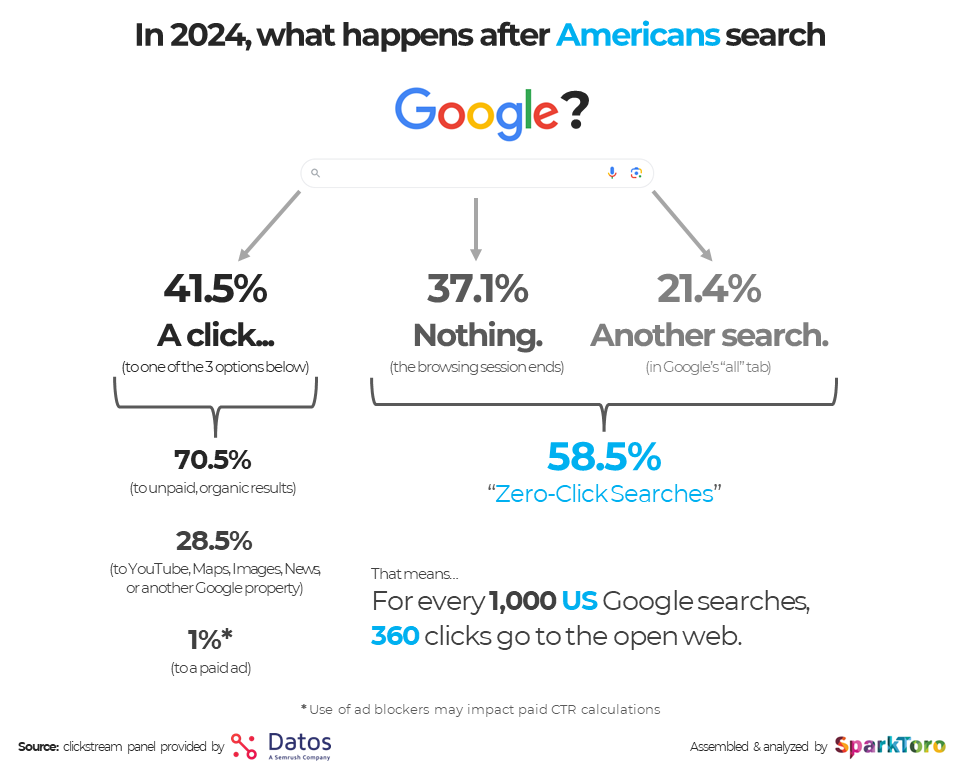
Take RevvGrowth’s project with Atlan again: many of their blogs were already ranking in the top 10, but were not featured. Through AI-assisted SERP reverse-engineering, the team studied how Google selected snippets down to the number of characters, position in the DOM, and bolded keywords and used structured prompts to reshape content into feature-eligible formats.
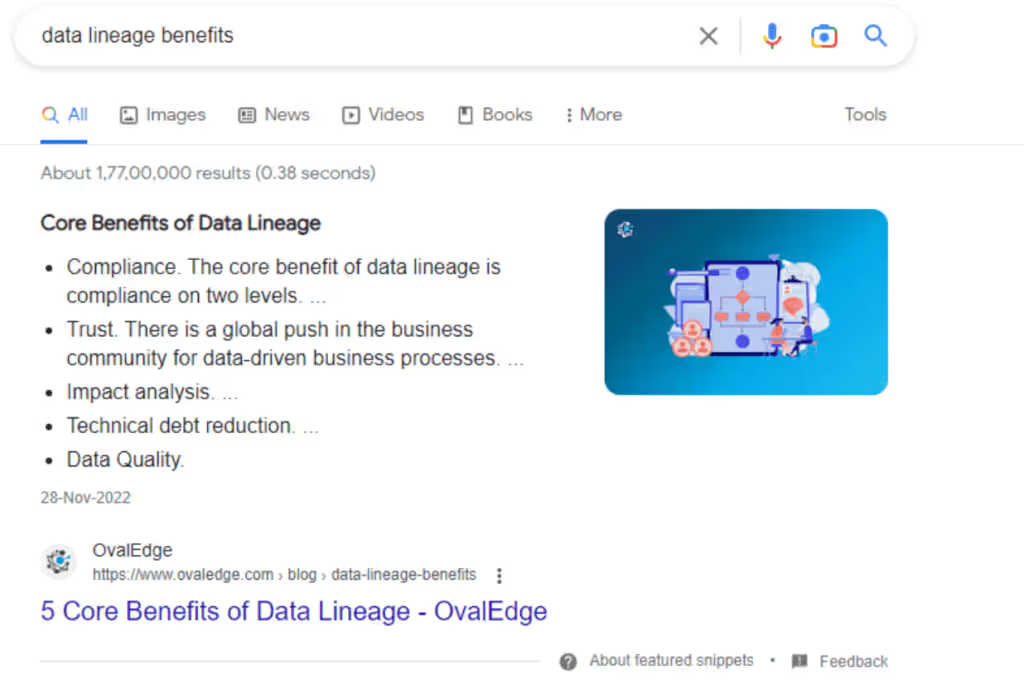
As a result, various snippets were secured for keywords like “Data lineage benefits,” unlocking top-of-page visibility with no new backlinks or content creation required.
But it’s not just about Google anymore.
In the age of AI Overviews, ChatGPT browsing, and Perplexity citations, LLM visibility is a new frontier. Early research suggests that structured, stat-backed content with concise headers and summary paragraphs is more likely to be referenced by LLMs in AI answers. That’s why forward-thinking SEO teams are training AI models to:
- Detect LLM-influential formatting
- Auto-generate concise, paragraph-first answers
- Build FAQ sections that align with “People Also Ask” logic
The better your content demonstrates these signals, the more likely it is to be surfaced by AI-driven search features.
Also Read: How Leading Companies Are Using AI in Marketing
What Businesses Should Do Right Now?
As AI reshapes the SEO terrain, transitioning to AI-augmented workflows isn’t optional, it’s essential. Here’s a practical, hybrid framework to align your team, streamline execution, and grow visibility effectively:
1. Integrate AI Tools Smartly
AI can dramatically boost your content throughput. The goal isn't to automate everything, but to delegate repetitive work (like outlines and metadata) while keeping human expertise in the loop for brand tone, accuracy, and E-E-A-T.
Take action now:
- Start with AI-assisted outlines using tools like Notion AI
- Automate metadata and keyword inclusion via SurferSEO or NeuronWriter
- Build an editorial checklist to review tone, facts, and trust signals manually
2. Optimize for AI-Powered Discovery
Search is no longer limited to Google. Your content now needs to be structured for LLMs like ChatGPT, Gemini, and Bing Copilot. That means clear subheadings, precise answers upfront, and supporting schema for AI crawlers. Getting cited in AI responses is becoming as valuable as a top SERP spot.
Take action now:
- Reformat blog intros to start with 2–3 sentence direct answers
- Add FAQ blocks with markup (use tools like RankMath or Yoast)
- Use ChatGPT plugins or AIO tools to simulate and test scrapability
3. Implement a Hybrid SEO Framework
Don't go full autopilot. Instead, set up a workflow where AI handles the scale, and humans handle the strategy. This hybrid approach has been shown to cut content production time in half while improving quality.

4. Build Omnichannel Visibility
AI is accelerating the overlap between search, video, audio, and voice. So should you. Your SEO content should flow into YouTube transcripts, podcast summaries, and even AI-generated short clips. Platforms like Descript and Castmagic make this easier than ever, and they’re crucial for visibility beyond the blog.
Take action now:
- Repurpose top blogs into short YouTube videos using Synthesia or Pictory
- Use Castmagic to auto-generate podcast show notes and summaries
- Add structured metadata (like YouTube chapters or podcast tags) for AI indexing
5. Blend Efficiency with Human Insight
AI can write. But it can’t relate. Your job is to inject real experiences, quotes, and context that build trust and make content resonate. The winning combination in 2025 is speed from AI, and depth from you. Many of the top-performing SEO teams and agencies guiding them now treat human storytelling as the secret ingredient that AI can’t replicate.
Take action now:
- Add 1 real client quote or case study per blog. Don’t just use stats
- Use Grammarly or Writer.com for tone refinement after AI drafting
- Keep a swipe file of anecdotes or analogies to enrich AI-written text
Expert Insight: Partner with an AI-First Marketing Agency.
Not every team has the bandwidth or the learning curve tolerance to build an AI-augmented SEO stack from scratch. That’s where the right agency can become a multiplier. The best AI-first marketing agencies don’t just run your campaigns; they bring proven workflows, tool stacks, and data-backed insights that help you skip months of trial and error.
If you want to know the best marketing agency, check out the Top 6 AI Marketing Agencies in 2025.
Final Thoughts
AI is changing the SEO game, but not by replacing us. It’s here to support the way we think, create, and scale. The teams that are winning right now aren’t using AI just to move faster; they’re using it to make better decisions, tell stronger stories, and stay visible across a changing search landscape.
But let’s be honest: figuring out how to put this into practice isn’t always easy. You’ve got tools, trends, dashboards, and deadlines, and sometimes, what you need is a partner who’s done this before.
If you’re looking to build that kind of system but don’t want to start from scratch, we’re here to help. At RevvGrowth, we work with leading teams to implement AI-augmented SEO strategies that deliver faster execution, smarter insights, and measurable visibility gains.
Want to see how that could work for your team? Let’s talk. We’ll show you what a hybrid SEO strategy looks like in action.

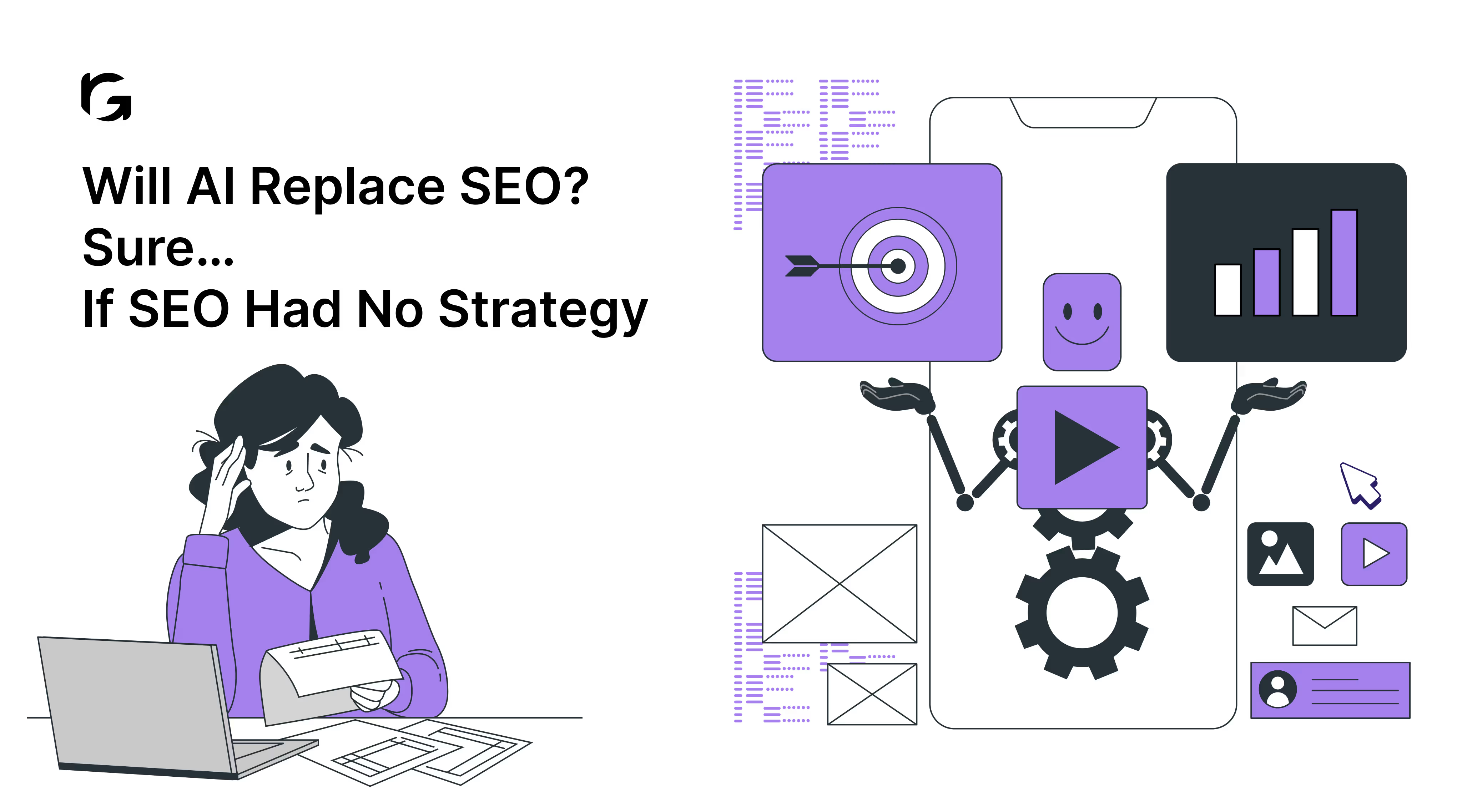

.svg)


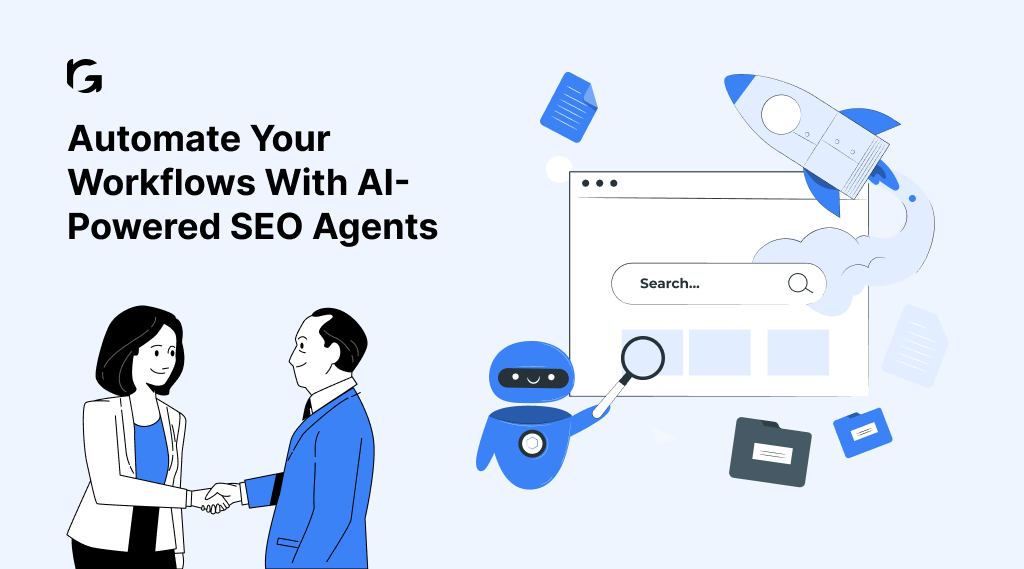
.webp)